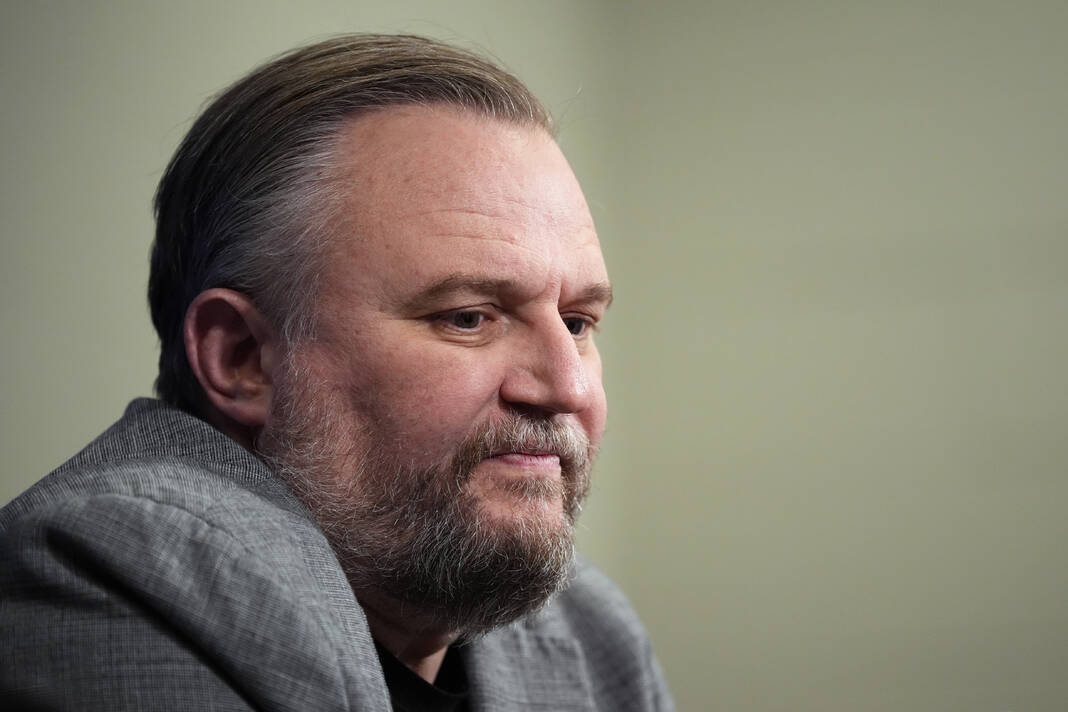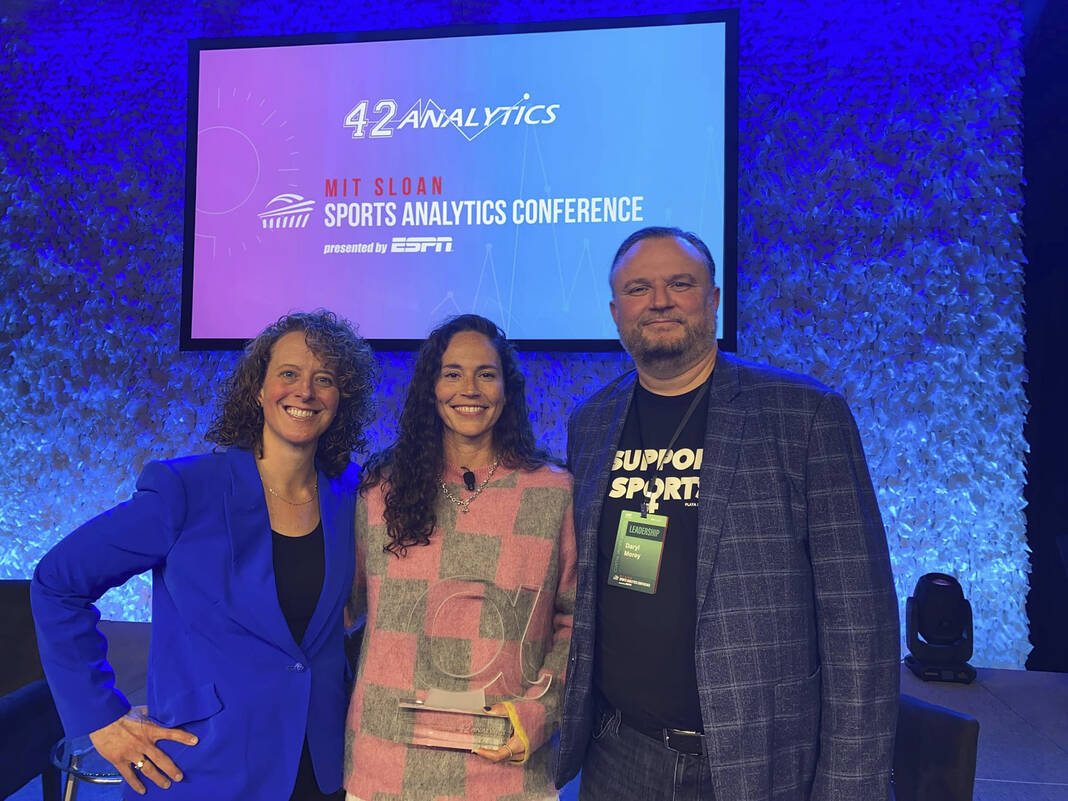
Philadelphia 76ers’ Daryl Morey pauses while speaking at a news conference before an NBA basketball game against the Atlanta Hawks, Friday, Feb. 9, 2024, in Philadelphia. (AP Photo/Matt Slocum)

This March 2023 photo provided by the Sloan Sports Analytics Conference shows Sue Bird, center, posed with Jessica Gelman, left and Daryl Morley, right, after presenting Bird with the Lifetime Achievement Alpha Award at the 2023 Sloan Sports Analytics Conference in Boston. Jessica Gelman has become an influential leader and innovator in the sports industry. She co-founded the MIT Sloan Sports Analytics Conference. She teamed with Philadelphia 76ers President Daryl Morey to not only found Sloan, but guide it into the preeminent forum for number-crunchers. (Jeff Pinette/Sloan Sports Analytics Conference via AP)

Philadelphia 76ers’ Daryl Morey speaks during a news conference before an NBA basketball game against the Atlanta Hawks, Friday, Feb. 9, 2024, in Philadelphia. (AP Photo/Matt Slocum)
By JIMMY GOLEN
AP Sports Writer
BOSTON (AP) — When it comes to artificial intelligence, the sports analytics crowd may be outnumbered.
The people who killed the sacrifice bunt and turned NBA games into a 3-point shooting contest aren’t quite sure what will happen when AI fully invades sports — whether in the front office or on the field.
“I’ve been in computer science a long time. This is the first thing we don’t understand,” Philadelphia 76ers general manager Daryl Morey said Friday at the MIT Sloan Sports Analytics Conference.
“That’s mind-boggling,” Morey said. “We’ve actually now created something, with 0’s and 1’s, where every step we’ve made the creation, but we don’t understand the results.”
The MIT conference annually brings together thousands of number-crunching sports nerds, who turn their data models loose on hot topics such as diversity, gambling or reversing the slowing pace of baseball games. But this year’s gathering had a decidedly AI focus, with panels and working papers on the potential for generative artificial intelligence to transform sports.
One talk looked at baseball strategy, another on how to provide Olympic content for the 200-plus countries competing in four dozen different sports, and a research paper used AI to provide player tracking data from a soccer broadcast.
Morey, one of the conference’s founders, was on a panel called “Winning with AI: The future of AI in sports.” The discussion touched on potential for improvements in scheduling, player safety, advertising, ticket sales and broadcasts that convert the on-field action into a Disney cartoon.
Kevin Lopes, an ESPN vice president for development and innovation, compared AI to the iPhone, which transformed everyday life by giving everyone with some coding skills the chance to come up with their own applications.
“I think about that when I think about generative AI,” Lopes said. “I don’t think anyone quite knows what that is yet. That’s fascinating to me, and what’s going to be the next thing.
“We exist in this moment in history, in my humble opinion, that every day we’re seeing new incremental innovations in AI,” he said. “What’s it going to be for the freshman at MIT in two years.”
Make no mistake, though: AI is already here.
Ballplayer-turned-broadcaster Carlos Peña said AI can be used to help a batter eliminate his blind spots. (But players will resist, he said, unless it’s stripped of its “mathiness” and translated into simple guidance such as, “look for the fastball up and in.”)
Anticipating complaints from scouts and others who say analytics can’t replace intuition, Pena said: “That’s not what we’re trying to do here. What we’re trying to do is enhance intuition.”
Christopher Jackson, the head of digital data and analytics for the Olympics, said AI can help create website content to satisfy fans of lower-profile sports from far-flung countries that usually don’t draw the attention of the mainstream media. One problem: Olympic planning is measured in decades, while major changes in AI come around every six months or so.
Amazon Web Services global head Julie Souza said the NFL is saving $2 million a year by running AI on its schedule, which has 1 quadrillion — that’s a one followed by 15 zeros — potential options that must account for holidays, shared stadiums and travel. AI is already dissecting which plays — and even which bodily poses — are most likely to cause injuries in a football game, she said.
“Rules are changing to make the game safer, to make the players more protected,” Souza said, adding that the information can trickle up from football to the military and others.
“It’s not just the NFL benefitting from this,” she said. “We’re not going back. There’s no way to go back from this. We’re just learning more and making the game safer. Which is great not just for the league, but for us on fans to have our players on the field more.”
Morey said the 76ers use AI for productivity — speeding up routine tasks — but it isn’t quite sharp enough yet to outdo the humans they have trying to improve their predictive modeling. “We haven’t found a ton there, but that will change,” he said.
And they will keep trying.
“There’s a lot of scary things with this, but it sort of is. This is happening,” Morey said. “There isn’t going to be a way to do all the safety stuff. … There isn’t actually going to be any way to control it. You really just lean into it, honestly, to help your business, to help what you’re doing.
“And there could be a very scary thing you hit. But what’s the alternative? Not embracing it?” he said. “That makes no sense.”
___
AP sports: https://apnews.com/sports

